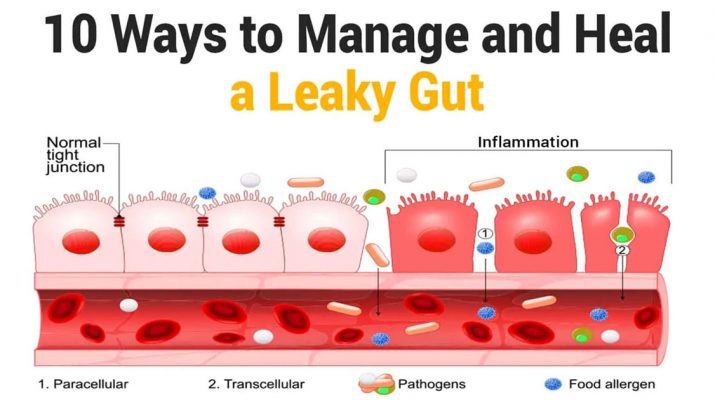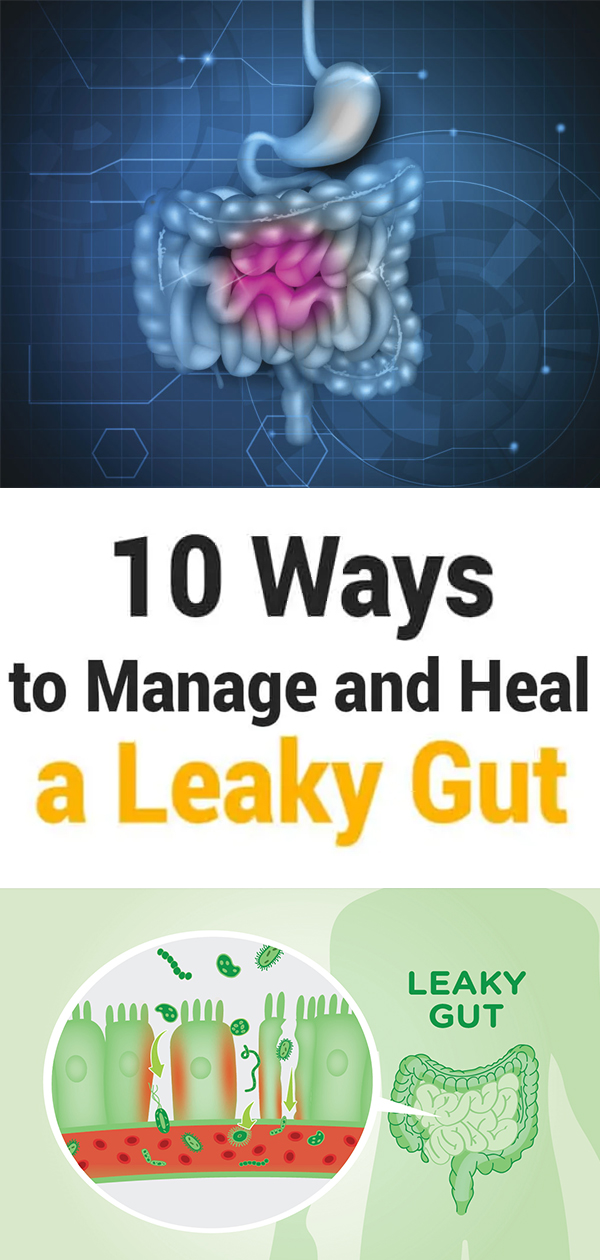Feeling sluggish, or unwell in general? You might find a leaky gut to be the culprit.
Your gut health is more important than most people seem to realize. The nervous system of the gut is so complex that some sources call it a second brain. Additionally, your gut represents nearly 70 percent of your immune system.
Unsurprisingly, a growing trend suggests that myriad health issues, including autoimmune diseases, cannot be resolved without addressing issues like leaky gut.
Here Are Ten Ways To Start Resolving Your Leaky Gut Syndrome:
1 – Keep A Food Diary
If you don’t have a food diary, start one. If you do have a food diary, keep at it.
A food diary should record not only what you eat, but also any metrics you are interested in tracking, such as weight or mood. It doesn’t need to involve a lot of writing. Since the intended audience is you, it is fine to record enough to jog your memory when you read back through it later, looking for clues about your condition.
This should be your very first step. It will help you establish a clear baseline for everything. You need to have some idea of what you currently eat and what your current symptoms are. Once you have determined that, you can move on to trying to remedy the problem with your gut. However, that doesn’t mean you should stop tracking your diet.
2 – Make Only One Change At A Time
A lot of articles that try to tell you how to address leaky gut recommend dramatic elimination diets. Such events can not only be hard on the body, but they can also introduce new confounding factors to the equation, making it harder to figure out what works and what doesn’t for you. This situation may be part of why research shows that it is best to try to change only one habit at a time.
Start by making only one change to either your diet or lifestyle. There are so many things going on in life that isolating factors that impact your health is quite hard. Try one new thing, stick with it for a minimum of one to two weeks, and track any changes you see.s can help give you some idea of the effect it has on you.
3 – It’S Easier To Start With Supplements
If you want to understand what a change is doing to your health, it helps to try to isolate factors. One way to isolate an element is by adding a supplement to your routine and changing nothing else. If you add a single supplement, you can get a reasonably good idea of what it does to you. In contrast, dietary changes always involve at least two shifts, making it difficult to determine which one is the real cause of positive change:
- The removal of one food.
- The addition of another food taking its place.
4 – Good Quality Salt
Your gut is lined with mucus. Mucus is 95 percent water, one percent salt, and four percent various other things, making salt an essential component of mucus. The mucus in your gut protects your stomach. When the mucus lining the gut is in poor shape, this is a major contributing factor to leaky gut.
Table salt is not the best option for healing your gut. It is better to use cleaner salts with fewer additives, such as kosher salt, canning, and pickling salt or sea salt. Some high brine sea salts also contain a mix of micronutrients that people swear by for improving their gut health.
5 – Glyconutrients
This terminology is a fancy word for good carbs. You can buy fancy, expensive supplements, and this may benefit you, especially at first. You can also go by consuming foods that contain good carbs, such as aloe and whole grains. Not all carbs are evil, and studies show that aloe vera does good things for conditions like diabetes.
6 – The Right Oils
You should probably worry less about the number of fats you consume and more about the quality. There is much controversy and misinformation concerning which fats are right for you and which are bad for you. Your food diary can help guide you in determining which fats work best for you, but some fats are routinely recommended as better and some as worse for your health.
Frequently Recommended as Good Fats:
- Olive oil
- Oils high in MCTs, such as coconut oil or palm oil.
- Butter or ghee (clarified butter).
Frequently Listed as Bad Fats:
- Peanut oil
- Canola oil
7 – Yeast Cleanse Diet
If you have symptoms of a yeast overgrowth, or if you have recently been on antibiotics, you should do a yeast cleanse diet. One sign of yeast overgrowth is vaginal yeast infections. A yeast cleansing diet starts with eliminating yeast-leavened foods, such as bread and pizza. Add in yogurt or another probiotic source and reduce sugars and carbs as much as possible. You should be eating mostly fresh or lightly cooked vegetables plus high-quality meats. You may need to do this for a few months.
8 – Address Any Nutrient Deficiencies
Good health isn’t just about the things we avoid in our diet. It also about the things we include. If you have taken any medication, especially daily, look up which nutrients your drug depletes and consider replenishing those nutrients through supplements or foods that are high in those nutrients.
9 – Fast Periodically
Fasting has a long history and is often a requirement of various religions. It is an excellent way to help clean out your gut and give it a break. You can think of it as downtime for maintenance. There are many ways to fast. If you have no experience fasting, you should be conservative and start with something like a short term juice fast rather than something like several days of water fasting.
10 – Probiotics Help Heal A Leaky Gut
Probiotics are friendly flora that supports your microbiome. They can be purchased in supplement form or consumed in foods. One of the most popular sources of probiotics is yogurt. It’s easy for most people to add good quality yogurt to their diet as part of breakfast or in place of a snack.
11 – Walk More
Walking promotes gut motility and also increases the rate at which lymph returns to the blood. Lymph is how the body removes wastes from its tissues. These two mechanisms are heavily involved in the body, “taking out the trash.” If you want to clean up your system, walking more is one of the best things you can do.
Final Thoughts On Resolving Your Leaky Gut
Leaky gut syndrome might wreak havoc on your life, but you do not have to let it. There are many dietary, along with lifestyle choices, that you can make to have a positive impact on your gut and overall wellness. Keep in mind that you are an individual, and you need to investigate what works for you. Tracking your data and making informed decisions based on that can help you navigate an often overwhelming amount of conflicting information.


